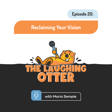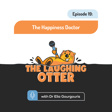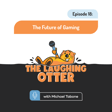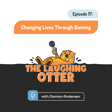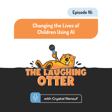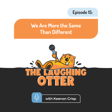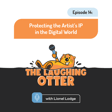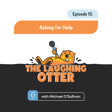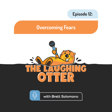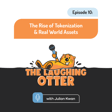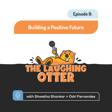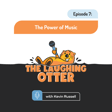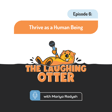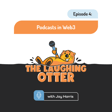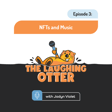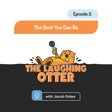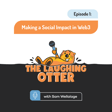Become a Creator today!Start creating today - Share your story with the world!
Start for free
00:00:00
00:00:01

The YMCA Rebuild Program with Mark Wilson
Transcript
Introduction to Laughing Otter Podcast
00:00:07
Speaker
Hello everyone and welcome to the Laughing Otter where we're making the world a happier place one person at a time. I'm your host, Jeff Bonesberger.
Guest Introduction: Mark Wilson, YMCA Bridge Program
00:00:17
Speaker
And on today's episode, we have Mark Wilson who is the director of education for the bridge program at YMCA. I am super excited about having Mark on the show today because this is an organization that I've been aware of for a while and fully support
00:00:38
Speaker
the work that they're doing in the bridge program, and primarily the program called Rebuild, giving people a second chance in life, which is very much in line with what the Laughing Otter believes in.
Discussion on YMCA Bridge Program Initiatives
00:00:53
Speaker
Hello, Mark, and welcome to the show. Thanks, Jeff, for having me. I really appreciate it. Yeah, I love what you guys are doing, and it's so much in line with the vision of the Laughing Otter that
00:01:07
Speaker
I'd just like you to share everything you can about the bridge program and rebuild and the successes that you're having. And hopefully there are people all over the world that will tap in on this because it's just such a great program.
00:01:26
Speaker
Yeah, absolutely. Yeah, so we're located in Melbourne, Australia, and predominantly we work in the justice system, especially with our young people. So I guess where we started, we started about 15 years ago, running the sports and recreation programs in the Youth Justice Centre here in Melbourne. And then it kind of
00:01:50
Speaker
kind of blossom from there. We created an education program, and then just went from strength to strength, really. We were seeing a revolving door with young people. So they were coming in, engaging with us in the prison, and then leaving, but then would see them again.
Rebuild Program: Evolution and Impact
00:02:12
Speaker
Maybe two weeks to a month later, they'll be back in.
00:02:17
Speaker
And we realized that once they were getting out, the level of support really dropped off. So what we then did was start to make our education program all about getting a job and creating that structure to be able to move forward in life, really. So from there, yeah, we did that. And then to take that step further, I think Rebuild was born then.
00:02:46
Speaker
where Rebuild started off as kind of a domestic maintenance company, but then blossomed into a commercial maintenance and now where we are is quite a long way away from where we started, which are working on government projects. But essentially we're giving jobs to young people as soon as they get out of prison and then setting them up
00:03:11
Speaker
to have the best success they can. Once they work with us for six to 12 months, we then transfer them on into work with bigger companies.
00:03:33
Speaker
employment. So that's been really good here in percent, but the young people that come to our programs brings that reoffending rate down to 5%. So that's probably one of the more uplifting statistics that we've produced. You don't need more evidence than that. 5% is a statistical error. That is absolutely fantastic. And it just
00:04:02
Speaker
It always struck me as absurd to put a young person into a prison system. They've already come from a disruptive environment. You put them in a prison system and then you throw them out back into that same environment and then expecting things to be different. It's ludicrous. So yeah, it's fantastic what you're doing.
00:04:30
Speaker
Yeah, absolutely. And then I think now our models...
00:04:35
Speaker
pretty much the same but it has changed a fair bit over the 15 years.
Integrating Sports and Education for Employment
00:04:41
Speaker
Now we work out in Ravenall Correctional Centre in Melbourne's west and we've got the sports and recreation contract plus education and the rebuild contract as well. So how it works now is a young person comes into prison and engages with us through sports activities.
00:05:01
Speaker
And then their conversations can start and relationships can start to be built. And from there, you know, we say, you know, what do you want to do? Is there anything we can help you with? And then usually they're then passed on to me as in education to come into my program, which runs for about six weeks. And then from there,
00:05:22
Speaker
all have built up a relationship with the guys then and then if they're up for it and if they're coming up to their release date, they then be put forth to our rebuild program. So we've actually got a workshop inside where we give the guys experience creating
00:05:41
Speaker
Creating wood products, you know, teach them how to use power tools and they're working. They're working full time, you know, Monday to Friday in there.
The Power of Positivity in Youth Rehabilitation
00:05:52
Speaker
And, you know, people can buy those wood products on our website. But yeah, so and then that lines up with their release date. So once they're released, they go straight into work with us on the outside with our commercial projects.
00:06:08
Speaker
It's much more streamlined now and it's working well. That's what we do and how we set up that structure for when they get out. Creating a really positive environment is probably the best way to put it as well because a lot of the young guys we've worked haven't been around
00:06:30
Speaker
Um, you know, a large group of positive people, um, like generally speaking. So it's, uh, it's, it's something that, that's, that we say working really well. Hmm. Yeah. And it's amazing how just some positivity in someone's life completely changes their outlook of how they should behave and on.
00:06:55
Speaker
and the outlook of what they have of themselves. So yeah, that's fantastic. Now I'm relatively familiar with how your program works, but when you talk about crews and stuff, just for the listeners, maybe give a little more insight of what it means to actually be on a crew. Because I think people on this call will be incredibly surprised with how it works.
00:07:25
Speaker
Yeah, so once they've exited prison, they then come into rebuild commercials. So on rebuild commercial, we've got crew leaders and sets of crews. So what we mean by that is, yeah, one crew leader, a majority of the time to one young person.
00:07:45
Speaker
And sometimes, depending on the job, that might be larger. Our crew leaders are tradesmen slash social workers in a way. And a built and a ready for young people coming out of prison and all the challenges that comes with that as well. And I think,
Post-Release Support and Employment Opportunities
00:08:07
Speaker
let's just say if you were to come out of prison as a young person straight into a job,
00:08:12
Speaker
a regular job where the company doesn't understand the complexities of just leaving prison, they're not going to give you a lot of leeway. And not to say that we give these guys an easy pass, but we understand that if they're on parole, they might have to go and do two drug tests a week, or they might have to go see their parole officer
00:08:40
Speaker
corrections officer to check in with them. They might have appointments that they have to go to that are mandated by corrections. So we understand that and we can take them to those appointments, but we can also get them working at 6am.
00:08:57
Speaker
on site. So it's balancing, I guess, all the responsibilities that comes with leaving prison. Sometimes it's not just a straight release where you have nothing to do with the correction system. A lot of the time, you've got a lot of appointments and everything like that afterwards. So our crew leaders know this, our case managers know this, and we can manage it that way. Because it's quite a difficult thing
00:09:24
Speaker
Prison's difficult in itself, but leaving prison, you know, the right ways is also quite difficult. And so when you talk about a crew, what are the types of jobs that they're doing? And again, I think people will be shocked at the level of sophistication of the work that they're doing. Yes. So, I mean, to start with, a lot of the jobs were, you know,
00:09:55
Speaker
painting, lawn mowing, general maintenance of businesses and that sort of stuff. And then we've really advanced now with the expansion of crew leaders but also connections with larger businesses into
00:10:10
Speaker
government projects. An example would be the level crossing removals. We've worked on those sites there, doing a lot of the landscaping for those areas. For those listening that aren't in Australia, we've got train level crossings where the train goes by. They're slowly being taken away from Melbourne.
00:10:37
Speaker
and Victoria really. Obviously, they need people to redo the landscape after something like that. The jobs that are coming now are much bigger, which is a good thing because the young guys can get more experience in different areas.
00:11:00
Speaker
A little insight, a lot of the guys that have like trade backgrounds that are coming out of prison, a lot of the young guys, they want those big jobs and the big jobs here in Melbourne at the moment are Metro tunnels,
YMCA Program Success Stories and Impact
00:11:12
Speaker
the Metro rail jobs as well, the new train lines and that sort of stuff. And they're getting a direct experience that can get them on those jobs, which is really good. Yeah, it's fantastic. And if there are any policymakers listening,
00:11:31
Speaker
across Australia, there's such a shortage for skilled workers and trades. You know, you should be reaching out to the bridge program and rebuild because there's some really skilled hands that are willing to work hard. So yeah, it's fantastic. How many crews you got now?
00:11:57
Speaker
Uh, so we're sitting, uh, it's crew leaders were sitting at about 15. Yeah. So, um, and we're, we're, we're always, always expanding as well. So, um, that gives us the ability to, to work with a lot of young people, which is good. Yeah. Yeah. 15 crews. What's the average number of people on the crew?
00:12:22
Speaker
So we like to, on average, we like to have one crew leader to one, one young person. Um, and yeah, depending on the jobs that can go to, you know, a few crew leaders and, and a few young people as well on that. So, um, they could, you know, some jobs are all working on the same one. Others, um, you know, they're, they're all around Melbourne, really. That's fantastic. And what, and when these guys go through, um,
00:12:52
Speaker
once they're done working on one of these crews, how long do they stay with you before they start getting hired by just other businesses?
00:13:03
Speaker
Yeah, it's a great question. So we like to have the young guys stay with us between 6 and 12 months. Some young people have gone over that, that's fine. But that 6 to 12 months is really good. We think that we would have had a relationship with them inside of prison for
00:13:23
Speaker
can be three plus months before they're released and then we have them working with us for six to 12 months after they're released. So it's a big
00:13:42
Speaker
It's a long time that we're going to be working with these young people and that gives us time to work through some of the things that they want to achieve, build up their skills and all that. So usually six to 12 months they're with us and that can be even sooner if they're ready to go.
00:13:59
Speaker
You know what I mean? And the opportunity comes up and that has happened before as well. But yeah, 6 to 12 months and then usually they're at that time where they want to move on and work with the larger organizations.
00:14:16
Speaker
As I said, there are some young guys that stay on and become crew leaders as well, which is really good. As an example, I was working with a young man, Rowan, who has been on our podcast before and he's told his story, but I met him about three years ago. Then he went away, he got transferred to another prison and then came back and then got in contact again.
00:14:42
Speaker
came and worked with us as soon as he got out. And he's been with us now for about 12 months. And then now, yeah, he's going for that leadership position as a crew leader, which is awesome. Especially the young guys that want to give back as well to the community and want to take that youth work, social work route. It's a really good opportunity for them because they've got that lived experience now with that real world experience.
00:15:11
Speaker
And that combination is really good. So they're able to give back and work with young guys that they were in that position not long ago. And that's a really good part of the job. You can work with young people for a long period of time. Because in community services, usually it's really short-term relationships that you're having with people.
00:15:41
Speaker
Uh, so I'm a big fan of, um, of, of having yet and watching someone grow, you know, it's, it's a really good thing to say. Uh, it's, yeah, it's definitely, it's definitely a beautiful story. Um, uh, they can watch unfold what, what percentage, uh, like the most of the people that go through your program end up with, with full-time jobs with the other companies.
00:16:07
Speaker
Yeah, definitely. We've got really good relationships with some of the big companies now. The guys that come from us, they're asked for, which is really good. We're in a position now in Melbourne where there's a lot of work at the moment.
00:16:28
Speaker
And they're saying unemployment is quite low and there's more jobs to fill. But we've got really good relationships with some bigger companies and we've had really good feedback as well with the guys that move on from us.
00:16:48
Speaker
Yeah, and like, obviously, we don't want to be moving people on too quickly, because then we can't do our jobs. But, but yeah, no, there's always a, there's always when the opportunities come up. Yeah, it works really well. And I haven't heard of. Yeah, there's really not many young people that sit on our books for that long, especially at the moment. Yeah, with all the work that's out there at the moment. Well, yeah, that's great. Like what a
00:17:14
Speaker
What a crazy idea. Give a kid a chance. Give him a job so he can actually earn a living so he doesn't have to go back to using criminal ways to feed himself. And it's amazing how people will turn around.
00:17:30
Speaker
What a crazy concept.
Financial Independence and Expansion Plans
00:17:33
Speaker
Just getting the space to create that environment, I think, is kind of unique in itself. But if you put the time and effort into it, we went from a car park and one office space to now we've just moved into our new home out in Melbourne's west.
00:17:53
Speaker
and, you know, a 1500 square metre factory where we've got all our, you know, be equipment and everything like that and tools and office space for our case managers and, you know, operation staff. And yeah, it's become it's we've come a long way. And it's all it's all about changing people's environments. And the what like from a from a business model,
00:18:23
Speaker
perspective, what a great idea that you actually are helping people's lives in a way that's self-sufficient financially. Am I correct in assuming that you don't get outside funding from my understanding and it's all self-sufficient? Is that correct?
00:18:51
Speaker
I think it's a mixture. I'm not all over the finances and everything like that, but I know that we have helped through grants and philanthropy projects, but also we're a part of big government contracts now. So we are making our way with our own finances and stuff. So it's good. It's good that you can stand on your own two feet. Yeah, fantastic.
00:19:21
Speaker
So what's the, what is the goal to, for the Y to extend? I know that the Y Victoria, um, is kind of a standalone from the other wise, but are any of the other YMCAs across Australia, um, thinking about taking on this, this model or do you know of any, anyone else that's kind of going to copy this?
00:19:44
Speaker
Yeah, look, I know that we've definitely had talks and everything like that. And the way that we've set ourselves up, it's hard. It would be...
00:19:59
Speaker
No, it's one of those things I think that is definitely what we're looking forward to do, is to expand into other states nationally. And I know that there's been conversations and that. But I mean, we're making a lot of impact here in Victoria. And I think an issue we don't want to come across is to expand too big, too quickly.
00:20:28
Speaker
Because then if we're stretched and everything like that, the end outcome isn't going to be a loss of money, but it's also going to be a loss of impact with people. Yeah. That makes sense. But it's definitely for the people who are listening, if there's anyone in corrections anywhere in the world, it's definitely a model to have a look at because you can't argue with
00:20:57
Speaker
you know, a 5% re-incarceration rate like that. Yeah, when the norm is much higher than that. So that's, yeah, it's fantastic. So what do you want to tell, anything else you want to tell people about the bridge program rebuild, where they can find more information, anything like that?
00:21:26
Speaker
Yeah, I guess with.
00:21:29
Speaker
What we're trying to do really is change people's perceptions of young people and I guess all people that go to prison. There's a thing called labelling theory, which I've been into recently looking at. It's looking at society. When people label someone as a criminal, that person ends up taking on that persona as well.
00:21:56
Speaker
So it's, when we're trying to change and everything like that, and that's why we believe language is a big thing, not only for people in the community, but the young people, we've got to stop, you know, when I run a program, I get them, it's the first, on day one, it's the first thing I talk about, and that's the language that we're going to be using. I don't really care about swear words, but I do care about the words like labelling themselves as a criminal.
00:22:24
Speaker
because that's the persona then they take on. And I think it's really important for people in the community and everything like that to understand that no one wants to go to prison or no one wants to do the wrong thing. But there's a different starting line for a lot of people. And I know I feel very privileged to have the upbringing that I had with a supportive family.
00:22:49
Speaker
And doing this job and doing this work, I think it's made me realize a lot that not everyone had the same upbringing as me, which I'm very grateful for.
Societal Perceptions and Second Chances
00:23:01
Speaker
But I think it's our duty to get in there.
00:23:06
Speaker
and help people that had less fortunate circumstances. So, yeah, and what we're trying to do, I guess, with our podcast as well, is to give people an insight into the corrections scene, I guess, in Victoria. And just kind of like the unspoken stories, because if you just go by,
00:23:32
Speaker
your experience of crime in your life, it's usually seeing people on the 6 o'clock news, you know, breaking the law and everything like that, you know, the worst of the worst. But a lot of people that end up in prison are there for some really unfortunate circumstances and I'm not saying everybody, obviously, but you know, a lot of the young guys we work with, you know,
00:23:57
Speaker
Just need that second chance I guess. So perception is what we're trying to change and I think with the use of language and getting the content out there to show that
00:24:14
Speaker
It could happen to anyone. I'm sure that people listening have done some things that they could have ended up in prison because of the circumstances they haven't. So it's good to reflect on that sometimes onto our own lives and go, yeah. I think you're spot on. I think when I think back to high school and being 18, 19 years old or even younger,
00:24:45
Speaker
and early days in university and stuff. Um, uh, we weren't always innocent. We just, the difference for a lot, uh, like I think of my mates and stuff like that. And there were people who, the only, the only reason they're not in prison is they didn't get caught. Yeah. And so.
00:25:07
Speaker
Um, yeah, I don't want to get too far in the details. Uh, but yeah, like I think, I think a little bit of, uh, uh, when judging others, you know, have a look in the mirror and remember what you were like, uh, at 18, 19, 20 years old. And then imagine, um, what you would have been like if you, if you didn't have a support network, uh, a family, um,
00:25:36
Speaker
to fall back on or an education or even the, um, I know a lot of my mates that going to university just wasn't even an option because of where they were, where they were coming from. So I, I too, like I, especially as I've gotten older, I, I become very, uh, aware of how lucky I, I have been like, and just the, um, yeah, just growing up in the house that I grew up in being,
00:26:06
Speaker
a white male with a Canadian passport and an Australian passport. That already puts me way ahead of a lot of people to get a good start in life.
Support Systems and Justice System Reforms
00:26:19
Speaker
And a big part of what we're doing at Laughing Otter is because I recognize that and I wanted to give back and give people a chance who didn't get that fair start.
00:26:36
Speaker
And it's also like when I became aware of the bridge program and the rebuild program, I just love what you're doing. It is so progressive thinking as far as how correctional facilities should be run. It's fantastic. Yeah, yeah.
00:26:59
Speaker
No, it's good. And we've got a lot of support from GEO, the prison, and some groups that believe in what we do. And Jeff, yourself as well, big supporter, which is great. And I guess that's what you need if you're going to do something like this as well.
00:27:19
Speaker
Um, cause you can only go so far by yourself. Um, but, uh, yeah, no, really, really appreciate, you know, uh, allow me to come on and then the platform. Yeah, I know it's, it's great. Thanks for sharing your voice and hopefully people hear this. And I really do believe that that old school belief that prisons are for punishment. Um, and the way that you prevent crime is through fear.
00:27:49
Speaker
I think that old school thinking like that is the people who believe that are dying off. And there's a whole, well, there's a few generations now that just believe that through education and giving people legitimate chances to bounce back is a much more effective tool to eliminating crime than this fear of
00:28:17
Speaker
Oh, you're going to go to prison or you're going to go to, this doesn't work. Yeah, yeah, exactly. And I think it's a great point because
00:28:28
Speaker
you've got the old school way of doing it. And the punishment is in the actual sentence, sentencing. So yeah, getting that sentence into the punishment and it shouldn't be while you're serving your time, that shouldn't be the punishment because you're just gonna push more and more people into that cycle of crime. Yeah, and like what we said earlier, it's ludicrous to think that somebody who's already coming from a bad environment
00:28:58
Speaker
or doesn't have a lot of options, you put them in prison, now you've added another negative stigma, plus they've been out of the society for two, three, five years, whatever, and then they have no new skills, and then you expect things to be changed? That's ridiculous.
Where to Learn More and Podcast Closure
00:29:18
Speaker
Well, where can people find more information about the bridge program and rebuild if they wanna find you?
00:29:28
Speaker
Yeah, our website is www.wimeciarebuild.org.au and then we've got an Instagram as well, wimecia underscore rebuild.
00:29:39
Speaker
Um, where else in our podcast is time to rebuild and you can get that on any platform that you get your podcasts on. Uh, so we're sitting at about 26 episodes at the moment. And that's that ranges from people in the, in the prison sector that work in there. And then, um, and also young people's stories that we've worked with before. And that's probably the best way to, um, to find out what we do and hear it directly from the young people themselves.
00:30:06
Speaker
And then on that website as well, you know, people are able to buy our products that the young people make while they're in prison. And that ranges from shopping boards and picnic boards to desks and chairs and some furniture.
00:30:23
Speaker
Yeah, there's a lot of ways people can get to us and even support us. And I think just by listening and reaching out on socials and everything like that, it's a huge support for what people can do. Well, that is fantastic, Mark. The YMCA in general has been long known as a great organization, and I think people
00:30:52
Speaker
that hear about what you're doing, the bridge program and rebuild, that's just gonna, that's a big part of that as well. So what you guys are doing is fantastic. I love hearing your stories and yes, thanks for coming on the show. No problem. So yeah, so everyone, thanks for listening and
00:31:20
Speaker
Remember to check out the laughing otter on the laughing otter.com. You can find us on discord, Instagram, Facebook, Twitter, and just help us all build this community and making the world a happier place one person at a time. And, you know, giving a platform, people like Mark, who are really changing the lives of people. Um, thanks again, Mark and, and everyone else for listening and we'll talk to you soon. Thanks, Jeff.
